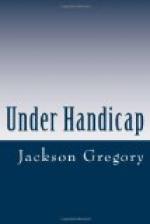“Poor old Roger,” he muttered to himself. “This is pretty hard lines. And a night out here on the ground—”
He determined to wait until the cool of the evening and then to persuade Hapgood to ride with him across the hills. It would be hard, but it seemed not only best, but almost the only way. So Conniston filled his pipe, thought longingly of the cigarettes he had left in his suit-case at the hotel, and, lying down near Hapgood, smoked and dozed in the warm stillness.
An hour passed. The shadow of the scrub-oak under which they had thrown themselves was a long blot across the sand. About them everything was drowsy and sleepy and still. Conniston, turning upon his side, his pipe dropping dead from between his teeth, saw that Hapgood was asleep. He lay back, looking upward through the still branches of the oak, his spirit heavy with the heaviness of nature about him. And musing idly upon the new scenes his exile had already brought him, musing on a pair of gray eyes, Conniston himself went to sleep.
The sun was low down in the western sky, dropping swiftly to the clear-cut line of the horizon, the air growing misty with the coming night, the sunset sky glowing gold and flaming crimson, when Conniston awoke. He sat up rubbing his eyes, at first at a loss to account for his surroundings. Then he saw Hapgood sprawled at his side and remembered. And then, too, he saw what it was that had awakened him.
A man in a buckboard drawn by two sweating horses was looking curiously at him while his horses drank noisily at the trough. He was an unmistakable son of the West, bronzed and lean and quick-eyed. The long hair escaping from under his battered gray hat vied with his long drooping mustache in color, and they both challenged the flaming crimson of the sunset. Conniston told himself that he had never seen hair one-half so fiery or eyes approaching the brilliant blueness of this man’s. And he told himself, too, that he had never been gladder to see a fellow human being. For the horses were headed toward the hills in the south.
“How are you?” Conniston cried, scrambling to his feet and striding with heavy feet to the buckboard.
“Howdy, stranger?” answered the red-headed man, his voice strangely low-toned and gentle.
“My name’s Conniston,” went on the young man, putting out a hand which the other took after eying him keenly.
“Real nice name,” replied the red-headed man. And dropping Conniston’s hand and turning to his horses, “Hey there, Lady! Quit that blowin’ bubbles an’ drink, or I’ll pull your ol’ head off’n you!”
Lady seemed to have understood, and thrust her nose deeper into the water. And the new-comer, catching his reins between his knees, took papers and tobacco from the pocket of a sagging, unbuttoned vest and made a cigarette. Licking the paper as a final touch, his eyes went to Hapgood.
“Pardner sick or something?”




